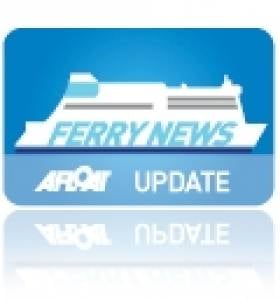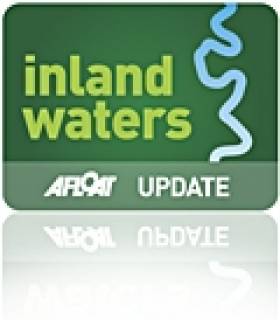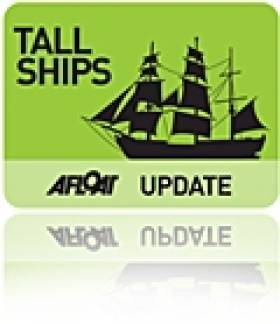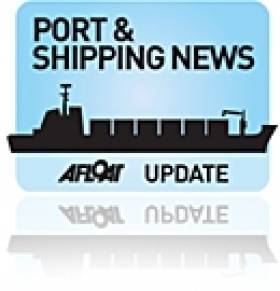Displaying items by tag: Dublin
Foot-Passengers to Lose Liverpool Link
Closure of the Birkenhead route will see the withdrawal of the 21,856 grt Italian built sister-ships Dublin Seaways and Liverpool Seaways. There are a number of options being investigated as to where the ro-pax pair will go, they may be deployed on other DFDS Seaways routes or placed on a sale charter arrangement.
In addition the Danish-owned shipping company is to close the freight-only Dublin-Heysham route this month. The route is served by the 13,074 grt Anglia Seaways which has a 114-trailer capacity. The vessel is due to be transferred to the Baltic Sea, according to DFDS Seaways which also operates an extensive route network in the North Sea.
Unlike DFDS Seaways use of the double river-berth terminal at Birkenhead, on the Wirral Peninsula, P&O and Seatruck vessels navigate through locks into the extensive Liverpool Docks system. Interestingly all three operators use sister-ships with P&O running the Dutch built ro-pax's Norbank and Norbay and Seatruck Ferries Spanish built Clipper Pace and Clipper Pennant.
Grand Canal Dredging Begins This Month
Waterways Ireland has confirmed that further dredging of the Grand Canal in Dublin will commence this month and continue till the end of April on the inland waterway.
The canal will be closed to navigation from Lock C4 at Baggot Street to Lock 1 at Suir Road for the removal of sediment and rubbish between Mespil Road and Portobello Harbour, making the canal navigable for a large range of boats.
Traffic management plans have been agreed with Dublin City Council to keep disruption to a minimum, and discussions have taken place with the National Parks and Wildlife Service on measures to minimise the impact on sensitive habitats along the canal.
Ferry-Go-Round on the Irish Sea
In the case of Irish Ferries, their Rosslare-Pembroke Dock route vessel, Isle of Inishmore arrived on the Mersey yesterday at the Cammell Laird dry-dock facility in Birkenhead.
The 1997 Dutch-built Isle of Inishmore had relieved the 50,938 tonnes 'flagship' Ulysses from the Dublin-Holyhead route which too had gone to Birkenhead for maintenance since January 4th.
The Ulysses is now back on service and the company's French routes cruiseferry, Oscar Wilde is covering the Isle of Inishmore's absence from Rosslare-Pembroke Dock sailings.
Continental services to France on the Rosslare-Cherbourg route will resume on February 16th when the Oscar Wilde returns from her overall. The Bahamas flagged vessel will re-open seasonal Rosslare-Roscoff sailings starting on May 13th.
In addition to conventional tonnage Irish Ferries also operate the fast-craft catamaran Jonathan Swift in tandem with Ulysses on the Dublin-Holyhead route. The Ulysses takes 3 hours 25 minutes while the 39-knot catamaran craft marketed as the Dublin 'Swift' is advertised with a scheduled passage time of 1 hour and 49 minutes.
The Australian-built catamaran was taken off the central corridor route yesterday to be drydocked also in Birkenhead until January 18th. Dublin Swift sailings return to the Dublin-Holyhead route on February 19th with the first crossing to depart at 14.30 hours from the capital port.
For the latest information on ferry sailings and reservations click: www.irishferries.com
Sailing Opportunities on 115-year French Tall-Ship
If you are interested in this adventure, registration is open until 1 March for those registering through the Alliance Française. A special Alliance Française price (excluding insurance) costs €780 and for €660 for those under 20 years of age. To book your place email: [email protected]
In July last year, the Belem, was chartered to make a special voyage to Dublin to celebrate the 50th Anniversary of Alliance Française in the capital. Taking part in the passage from Roscoff were 17 Irish people who joined in the crew. The four-day visit also celebrated the French national day, Bastille Day (14 July) which formed part of the inaugural French Market, held on the quayside close to the Convention Centre.
The ship was launched on June 10th 1896 and built in Nantes. She was named the Belem, after the north Brazilian port where the Crouan family had founded a trading post a few generations earlier. For nearly two decades the Belem sailed the Atlantic, carrying a diverse range of cargo but mostly spices, sugar and cocoa beans. The Belem would sail upriver on the River Seine to supply the cocoa beans for a Paris-based chocolate-maker.
During her long and varied career, the barque was sold to Arthur Ernest Guinness in 1921. Under the control of the Irish brewing dynasty, the vessel was renamed Fantôme II. The Guinness family established a strong attachment to the vessel which was completely refurbished from a working cargo vessel into that of a luxurious appointed yacht capable of accommodating 40 guests. Part of the work included an extension to the deckhouse for the purposes of a floating office, so business could be conducted, wherever the vessel happened to be.
In the period between March 1923 to March 1924 the Fantome went on a round the world tour going through the Panama Canal on the way out and returning via the Suez Canal.
Since 1987 the Belem has provided sail-training opportunities and is owned and operated by the Belem Fondation, a Paris based organisation set up by the Caisses d'Epargne, BPCE Group, after they bought back the ship in 1979. The principle role of the foundation is to keep the three masted barque as part of France's National Heritage. The vessel's historical and cultural significance was recognised in 1984 when the French government listed the barque as an historic monument.
Aside the role of sail training the Belem is unique in that she continues to carry occasional commercial cargo. In recent years the vessel has carried cargoes of wine from Bordeaux to Montreal in the Canadian French speaking province of Quebec. For information about Alliance Française in Ireland logon HERE in addition to the history and work of the Belem Foundation by clicking here.
Looking for further reading on Tall Ships in Ireland? Click the links below:
Click this link to read all our Tall Ships Stories on one handy page
Previewing Ireland's Tall Ships 2011 Season
Can Ireland Get a New Tall Ship?
Bilbao Returns to Baltic Sea 'Roots'
For the last 17 years the Pride of Bilbao has operated between Portsmouth and Bilbao under charter to P&O. Built in 1986, she was launched as Olympia for Viking Line between Stockholm and Helsinki, then the Baltic Sea ferry was one of the largest overnight passenger capacity ferries in the world. At 177 metres long the vessel can accommodate 2552-passengers, 600-vehicles and space for 77-trucks. She has a sister, the Mariella, which currently operates on Viking Line's Stockholm-Mariehamn–Helsinki service.
In 1993 the vessel was renamed Pride of Bilbao and launched a new service on the Bay of Biscay, under charter from her Scandinavian owners. The following year ICG purchased the Pride of Bilbao from Viking Line and she was re-registered to the Bahamas. The vessel was subsequently entered into a British bare-boat charter arrangement between P&O Ferries and ICG. Due to unsustainable losses the route closed on 28 September this year but rivals Brittany Ferries soon shortly announced they would reopen the route in Spring 2011.
Throughout the Pride of Bilbao's career under ICG (parent company of Irish Ferries), the cruiseferry has only once visited Ireland. In between Spanish sailings, she was sub-chartered for a three-day Christmas mini-cruise from Portsmouth to Dublin in 2004, where the Pride of Bilbao berthed at the ferryport close to the ICG headquarters.
Stena to Close Larne-Fleetwood Route
The route has made significant losses over recent years and to running an aging fleet on the 7-hour service. Stena cite that investment in new tonnage was not an option due to higher capitol costs. "No business can continue to carry such losses on an ongoing basis so there is no alternative but to close the route at the end of this year," he added.
The trio of vessels, Stena Leader (1975/12,879grt), Stena Pioneer (1975/14,426grt) and Stena Seafarer (1975/10,957grt) serve the link between Lancashire and Northern Ireland which takes freight, cars and their passengers but does not cater for 'foot' passengers.
Late last month a fire took place in the engine room of the Stena Pioneer during a sailing to Fleetwood, the fire was extinguished using onboard equipment and fortunately without incident to crew or passengers.The Stena Pioneer was operated by B&I Line as their Bison in a joint service with Pandoro on the Dublin-Liverpool route between 1989-1993.
Under the new agreement, Stena Line's take-over of Belfast-Heysham, the port is a close neighbour to Fleetwood will include the 13,000 tonnes sisters Hibernia Seaways and Scotia Seaways.The other route aquired is Belfast-Birkenhead (Liverpool) which is significant in that the deal will include the purchase of the chartered 27,000 gross tonnes ro-pax twins, Mersey Seaways and Lagan Seaways. The sisters were built in 2005 at the Visentini shipyard, Italy, which also built the ro-pax sisters Dublin Seaways and Liverpool Seaways.
Measuring 21,000 gross tonnes these vessels operate Dublin-Birkenhead route but remain under DFDS Seaways control and this applies to their freight-only service from the Irish capital to Heysham served by the Anglia Seaways. The 120-trailer freight ferry is also a sister of the Belfast-Heysham pair.
Notably the transaction will see Stena Line enter operations on the Mersey for the first time.The Swedish operator will use the river's Birkenhead Twelve Quays ferryport terminal located on the Wirral, opposite the famous Liverpool waterfront.
Stena Line will not only share the double berth facility with DFDS Seaways but also the Isle of Man Steam Packet (IOMSPCo) which in recent years has operated winter sailings to Douglas. In the summer the Isle of Man ferry operator uses the Liverpool landing stage berth on the other side of the river which is also shared by the 'ferry cross the Mersey' fleet operated by Mersey Ferries.
Irish Sea Newcomer Sells Routes To Stena
The sale covers the routes between Belfast and Birkenhead (Liverpool) and Belfast-Heysham. Operating on the northern Irish Sea routes are two 13,000 gross tonnes Japanese built freight ro-ro ferries sisters Hibernia Seaways and Scotia Seaways in addition to two chartered ro-pax vessels as part of the transaction.
Niels Smedegaard, CEO of DFDS, said: "The Irish routes we took over in conjunction with the purchase of Norfolkline have, in spite of the recent impressive efforts by everyone employed on the routes, in the last two years lost more than thirty million euros. Given the depressed economies a turnaround of the activities, without structural solutions, is not realistic. On this basis, we have decided to scale back our activities and sell the two routes to and from Belfast."
In the deal Stena Line, the Swedish owner will also take control of port terminals in Belfast, Birkenhead and Heysham. The majority of shore-based staff at these port terminals will be transferred to Stena, maintaining their current conditions.
DFDS and Stena Line will share staff at these locations during an agreed transitional period at the end of which DFDS will establish their own agency operations at Birkenhead and Heysham.
The new arrangement will see DFDS focusing on its other services between Dublin to Birkenhead (which includes passengers) and from Dublin to Heysham. Italian built sisters ro-pax sisters Liverpool Seaways and Dublin Seaways currently operate on the Dublin-Birkenhead route and the 120-trailer freight-ferry, Anglia Seaways maintains serving the Heysham route. Operations at the Dublin Port terminal are not affected by this transaction.
DFDS will continue to review their strategic and operations routes in Dublin, which is expected to be completed in the first quarter of 2011. The Danish owned shipping and logistics transportation company operate an extensive route network throughout the Irish Sea, North Sea and Scandinavia.
Dublin Port Company Trains Five Developing Countries
Representatives of Tanzania, the Maldives, Ghana, Indonesia and Malaysia have benefited from the experience of Ireland's largest and most successful port management company.
Dublin Port Company today announced it has completed a training programme for five developing countries as part of its UN-appointed role under UNCTAD's TrainForTrade programme.
Efficient maritime transport and port services are essential for creating sustainable economies in the developing world. The TrainforTrade programme helps ports in developing countries build better local economies by attracting and generating greater trade volumes using improved commercial handling practices learned from their training partner. In 2007, Dublin Port Company was chosen as the United Nation's partner to deliver training to ports in English-speaking countries in the developing world.
Representatives from the ports of Tanzania, the Maldives, Ghana, Indonesia and Malaysia, who have successfully completed their Train for Trade programme were today presented with their certificates by the Minister of State for Overseas Development, Mr. Peter Power TD, at a ceremony in Dáil Éireann.
Speaking at the presentation of certificates to course participants, Minister of State for Overseas Development, Mr. Peter Power, TD, said: “I congratulate Dublin Port Company on successful completion of UNCTAD’s TrainforTrade programme. Five ports in developing countries have benefited significantly from the skills and knowledge from Ireland’s largest and most successful port management company. This programme is important for improving trade in the developing world and driving economic growth.”
Responding to the Minister, Mr. Eamonn O'Reilly, Chief Executive, Dublin Port Company, said: "Dublin Port is proud to have been able to contribute to the UN's English-speaking pilot port training programme. We became involved in this initiative as part of our wider CSR programme and we hope that we have made a positive contribution and left a lasting legacy to help developing countries build stronger, more efficient ports for the future."
Dublin Port Company is a self-financing, private limited company wholly-owned by the State, whose business is to manage Dublin Port, Ireland's premier port. Established as a corporate entity in 1997, Dublin Port Company is responsible for the management, control, operation and development of the port. Dublin Port Company provides world-class facilities, services, accommodation and lands in the harbour for ships, goods and passengers.
Located in the heart of Dublin City, at the hub of the national road and rail network Dublin Port is a key strategic access point for Ireland and in particular the Dublin area. Dublin Port handles over two-thirds of containerised trade to and from Ireland and 50% of all Ireland's imports and exports, making it a significant facilitator of Ireland's economy. Dublin Port also handles over 1.5 million tourists through the ferry companies operating at the port and through cruise vessels calling to the port.
Liffey Odyssey for Canoeists This Saturday
The annual Odyssey on the Liffey canoe tour is scheduled for this coming Saturday 20 November.
Organised by the Canoeing Ireland Training Centre and the Wild Water Kayak Club, the tour runs from the Garda Boat Club in Islandbridge along the capital's historic quays to the East Link Bridge in the Docklands.
The event is open to all paddlers who have a minimum of Level 2 skills standard and who have their own canoe or kayak. Registration details are available on Canoeing Ireland's website at www.canoe.ie.
Government Begins Review of Irish Ports
Minister for Transport Noel Dempsey T.D. today announced the launch of a national ports policy review with the publication of a consultation document.
There are ten State commercial port companies established and operating pursuant to the terms of the Harbours Acts 1996 - 2009; Cork, Drogheda, Dublin, Dundalk, Dún Laoghaire, Galway, New Ross, Shannon Foynes, Waterford and Wicklow.
It is estimated that approximately 99% by volume of all goods traded into and out of Ireland are handled at our ports. Dublin Port is the State's biggest port handling approximately 44% of all tonnage in 2009. Cork and Shannon Foynes were the second and third biggest ports respectively in 2009.
Today's consultation document provides stakeholders with an opportunity to help shape future ports policy.
Speaking today Minister Dempsey said; "In 2005 our national Ports Policy Statement outlined national ports policy in a single document for the first time. Since then the commercial, technological, and regulatory environment in which Irish ports operate has changed dramatically, both domestically and globally. It is now time to carry out a review of this policy framework to ensure that our ports are properly positioned for the future.
Since 2005 our ports have experienced both record highs and more recently sharp declines in tonnage throughput. The ports face considerable challenges and it is important that national policy helps address these. The indications are that the country's return to economic growth will be export led. In this regard, it is vital that the ports are in a position to facilitate this and to make their contribution to improving national competitiveness.
I would encourage all interested parties to engage fully in this important consultation process."
The consultation document provides an overview of developments in the sector since 2005 and poses a number of questions on the continued validity and future direction of national ports policy.
Important issues addressed in the document include planning and funding future port developments, the role ports have to play in delivering the "Smarter Travel" agenda, competition within the sector and the corporate governance regime for port companies.
The public consultation period is scheduled to continue until Friday 29th October 2010.
The full Consultation Document is available for download below
To make a submission click HERE
Read Tom MacSweeney's Island Nation blog on the importance of ports HERE



































































